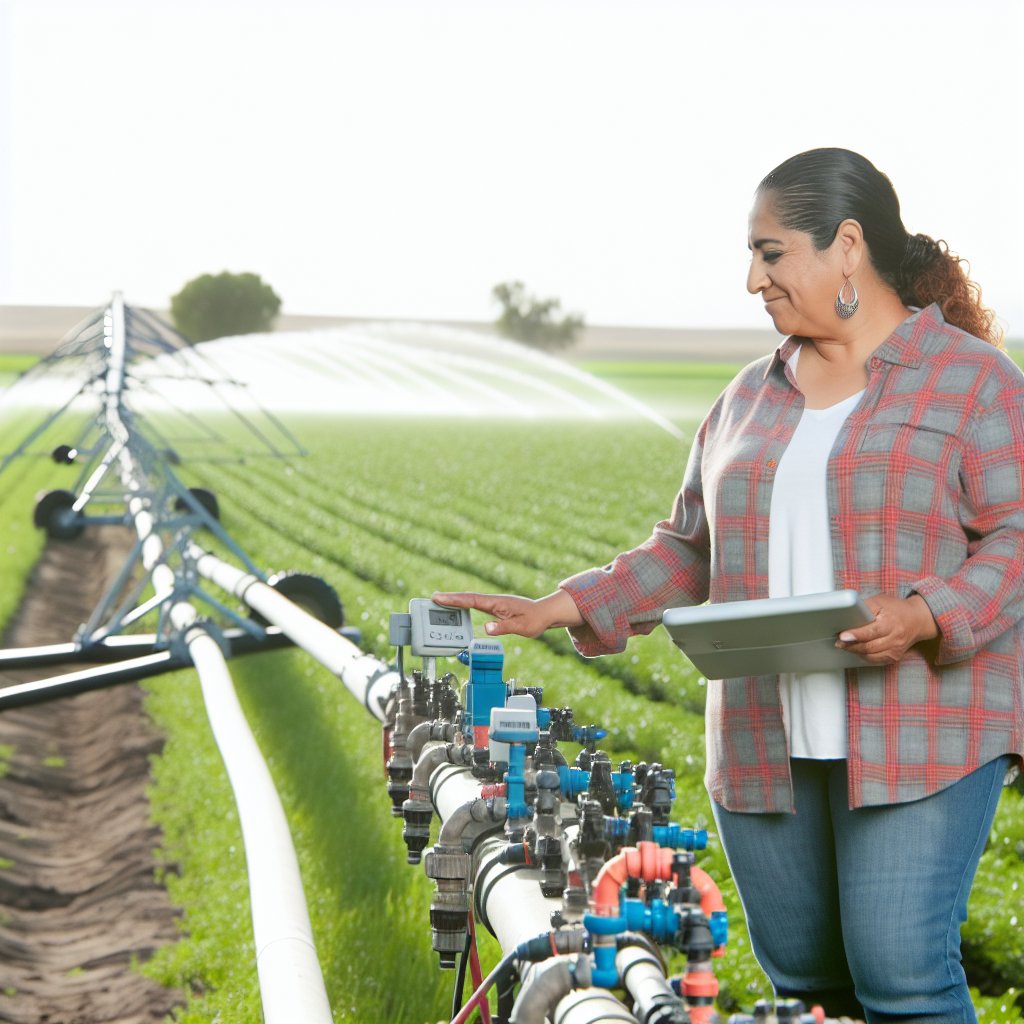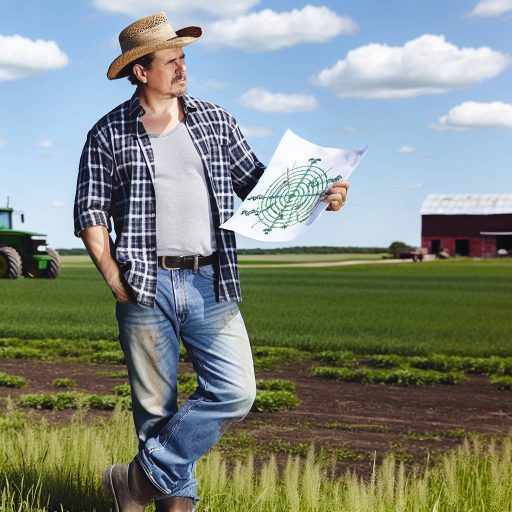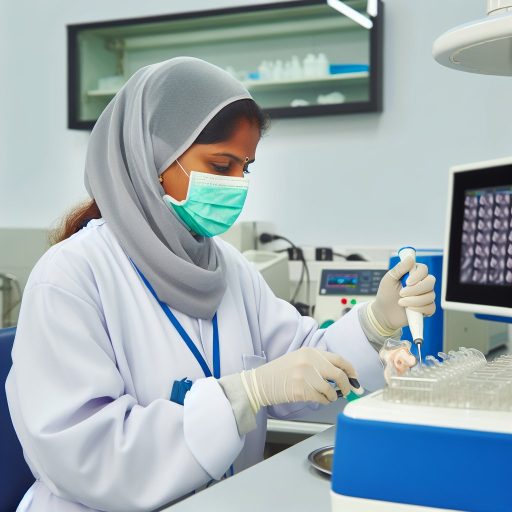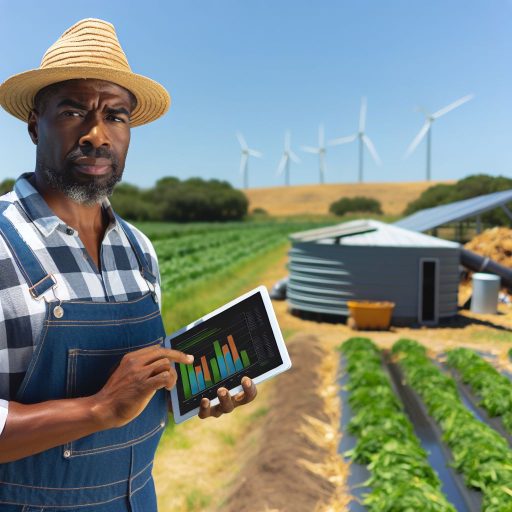Introduction:
Efficient irrigation technology is crucial for specialists to optimize water usage and crop yield.
In recent years, there have been significant advancements in irrigation technology to meet the growing demands of agriculture.
Enhanced Precision:
New irrigation systems now use sensors and data analytics to precisely determine water requirements for specific crops.
This precision helps specialists avoid over or under-watering, leading to improved crop health and yield.
Smart Irrigation Controllers:
Smart controllers enable specialists to remotely monitor and control irrigation systems through mobile apps.
This feature allows for real-time adjustments based on weather conditions, soil moisture levels, and plant needs.
Drip Irrigation Techniques:
Drip irrigation is becoming increasingly popular among specialists due to its efficiency in delivering water directly to the root zone of plants.
This technique reduces water wastage and ensures better nutrient uptake by crops.
Solar-Powered Systems:
Solar-powered irrigation systems are gaining traction as they provide a sustainable and cost-effective solution for specialists.
These systems harness solar energy to operate pumps and sensors, reducing reliance on conventional power sources.
Automation and Robotics:
Automation and robotics are revolutionizing irrigation practices by enabling specialists to automate tasks such as irrigation scheduling, monitoring, and maintenance.
This technology streamlines operations, increases efficiency, and reduces labor costs.
Advancements in Irrigation Technologies:
With the continuous evolution of irrigation technology, specialists can expect further advancements to enhance water efficiency.
They will also increase crop productivity and ultimately contribute to sustainable agriculture practices.
Drip Irrigation Systems:
Drip irrigation systems work by delivering water directly to the roots of plants through a network of tubes and emitters.
This method ensures that only the necessary amount of water is delivered, avoiding wastage and promoting water efficiency.
Specialists benefit from drip irrigation as it helps in reducing water usage, fertilizer leaching, and weed growth.
Additionally, it promotes healthier plant growth and minimizes the risk of diseases caused by overwatering.
Benefits of using Drip Irrigation for Specialists:
- Efficient water usage leading to water conservation.
- Precise delivery of water to the root zone ensures optimal plant growth.
- Reduction in fertilizer and pesticide runoff, promoting environmental sustainability.
- Cost-effective in the long run due to savings in water and energy expenses.
Comparison with Traditional Irrigation Methods:
Drip irrigation is more precise and targeted, unlike traditional overhead sprinkler systems that water indiscriminately.
Traditional methods can lead to water wastage through evaporation and runoff, which is minimized in drip systems.
Transform Your Career Today
Unlock a personalized career strategy that drives real results. Get tailored advice and a roadmap designed just for you.
Start NowDrip irrigation is suitable for various terrains, including sloped or irregularly shaped landscapes, where traditional systems may struggle.
Overall, drip systems offer greater control, efficiency, and sustainability compared to traditional irrigation methods.
Sensor-Based Irrigation Systems:
Sensor-based irrigation systems utilize advanced technology to monitor soil moisture levels, weather conditions, and plant water requirements in real-time.
These systems enable specialists to make data-driven decisions regarding irrigation scheduling, leading to improved water efficiency and crop productivity.
How sensors can optimize water usage for specialists:
By accurately measuring soil moisture content and environmental factors, such as temperature and humidity, sensors provide valuable insights into the actual water needs of plants.
This data helps specialists avoid overwatering or underwatering, leading to significant water savings and reduced operational costs.
Case studies of successful implementation:
- A vineyard in California implemented a sensor-based irrigation system that reduced water usage by 30% while increasing grape yield by 15%.
- By precisely delivering water based on plant needs, the vineyard achieved better crop quality and resource efficiency.
- A farm in Australia adopted sensor-based technology to monitor soil moisture levels and weather patterns.
- As a result, the farm optimized irrigation scheduling, resulting in a 20% reduction in water consumption and improved crop yields.
- The farm also reported enhanced sustainability practices.
- A golf course in Florida integrated sensor-based irrigation to manage turf conditions more efficiently.
- By collecting real-time data on soil moisture and climatic conditions, the golf course reduced water usage by 25% and minimized instances of overwatering.
- The course maintained high-quality playing surfaces while conserving water resources.
Sensor-based irrigation systems offer tailored solutions for specialists to optimize water usage and enhance agricultural practices.
Through the use of advanced technology and data analysis, these systems play a crucial role in sustainable water management and improved crop performance.
Explore Further: Steps to Become a Quality Control Inspector in Farming
Remote Monitoring and Control
Remote monitoring and control systems allow specialists to track and manage irrigation processes from a remote location.
These systems typically involve sensors, controllers, and communication devices that work together to provide real-time data on soil moisture levels, weather conditions, and irrigation scheduling.
With remote monitoring and control systems, specialists can access critical information about their irrigation systems at any time, from anywhere with an internet connection.
This level of accessibility enables them to make informed decisions and adjustments to optimize water usage, increase efficiency, and prevent costly issues such as overwatering or underwatering.
Advantages for Specialists in Managing Irrigation Systems from Anywhere
- Enhanced Efficiency: The ability to monitor and control irrigation systems remotely saves specialists time and resources by eliminating the need for on-site visits.
- Real-Time Data: Remote monitoring systems provide up-to-date information on soil conditions, water usage, and system performance, allowing specialists to make immediate adjustments as needed.
- Cost Savings: By maximizing water efficiency and reducing waste, specialists can save money on water bills and maintenance costs associated with irrigation systems.
- Flexibility: Specialists can make adjustments to irrigation schedules and settings from any location, ensuring that crops receive the right amount of water at the right time.
Discussion on the Latest Advancements in This Technology
- IoT Integration: Remote monitoring and control systems are increasingly incorporating IoT (Internet of Things) technology to enhance connectivity and data sharing capabilities.
- Automated Decision-Making: Advanced systems can analyze data and make recommendations or adjustments automatically, reducing the need for manual intervention.
- Predictive Analytics: Some systems use predictive analytics to forecast future irrigation needs based on historical data, weather patterns, and crop requirements.
- Mobile Apps: Many remote monitoring systems now offer mobile applications that allow specialists to monitor and control irrigation systems from their smartphones or tablets.
Remote monitoring and control technology offers significant benefits for specialists in managing irrigation systems more effectively and efficiently.
By leveraging the latest advancements in this technology, specialists can improve water usage, optimize crop growth, and achieve better overall outcomes in agricultural production.
See Related Content: Interview with a Professional Conservation Scientist
Smart Irrigation Controllers
Smart irrigation controllers are devices that use weather data to adjust watering schedules.
Specialists benefit from water efficiency as these controllers adapt to local conditions.
Cost savings are another advantage, as water is only used when necessary.
Showcase Your Business Today
Reach thousands of readers actively exploring professional services. Publish your business profile and grow your audience now.
Publish NowSome popular brands of smart irrigation controllers include Rachio, Hunter, and RainMachine.
See Related Content: Innovative Conservation Projects Around the World

Precision Agriculture Techniques:
Introduction to precision agriculture and its relevance to irrigation specialists:
Precision agriculture is a farming management concept that uses technology to ensure optimal efficiency in the use of resources such as water, fertilizers, and pesticides.
This approach involves the collection of data from multiple sources, including satellites, drones, and sensors, to create detailed maps of the field.
These maps help farmers identify variability within their fields, allowing them to tailor their irrigation strategies to specific needs, ultimately maximizing yields.
How precision agriculture techniques can improve water management:
Precision agriculture techniques enable farmers to precisely apply water only where and when it is needed, minimizing waste and conserving this precious resource.
By using real-time data on soil moisture levels, weather conditions, and crop health, farmers can adjust their irrigation schedules accordingly.
This targeted approach not only improves water efficiency but also enhances crop health and yields.
Case studies of precision agriculture practices in irrigation:
Agricultural experts have reported significant success using precision agriculture techniques in irrigation.
For example, a study in California’s Central Valley found that farmers were able to reduce water usage by up to 25% while maintaining or even increasing crop yields.
Additionally, in Australia, farmers have adopted precision agriculture to combat water scarcity by implementing drip irrigation systems that deliver water directly to plant roots.
These case studies demonstrate the tangible benefits of precision agriculture in optimizing water management for irrigation specialists.
See Related Content: Role and Duties of an Agricultural Technician
Automated Irrigation Systems:
Automated irrigation systems are becoming increasingly popular among specialists for their convenience and efficiency.
These systems utilize technology to automate the process of watering plants, saving time and effort in manual irrigation tasks.
Overview of automated irrigation systems:
- Automated irrigation systems consist of sensors, controllers, valves, and other components that work together to deliver water to plants.
- These systems can be programmed to water plants at specific times and in specific amounts, based on factors such as soil moisture levels and weather conditions.
- They can be set up for different zones in a garden or farm, allowing for precise watering tailored to the needs of each area.
Advantages for specialists in terms of labor savings and precision:
- One of the key benefits of automated irrigation systems is the significant labor savings they offer.
- Specialists no longer have to spend time manually watering plants, freeing them up for other tasks.
- These systems also ensure precision in watering, as they can deliver the right amount of water directly to the roots of plants, without wastage or under-watering.
- Specialists can rely on the consistency of automated systems to maintain optimal soil moisture levels for plants, promoting healthy growth and reducing the risk of diseases caused by overwatering or underwatering.
Examples of different types of automated irrigation systems:
- Drip Irrigation: This system delivers water directly to the roots of plants through a network of tubing and emitters, reducing water loss due to evaporation or runoff.
- Sprinkler Systems: These systems use sprinkler heads to distribute water over a designated area, covering a larger surface area compared to drip irrigation.
- Smart Irrigation Systems: These advanced systems use weather data and soil moisture sensors to adjust watering schedules automatically, optimizing water usage and plant health.
Automated irrigation systems offer specialists a range of benefits, from labor savings and precision in watering to improved plant health and water efficiency.
By incorporating these systems into their operations, specialists can enhance productivity and achieve better results in their irrigation practices.
Advancements in Irrigation Technology
Staying abreast of the latest trends in irrigation technology is crucial for specialists in the field.
Embracing new advancements improves efficiency and promotes sustainability in agriculture.
By incorporating cutting-edge tools and techniques, specialists can optimize water usage and minimize environmental impact.
This benefits the crops and the overall ecosystem.
Furthermore, being knowledgeable about the latest developments allows specialists to adapt to changing conditions and challenges in the industry.
Such knowledge provides a competitive edge and enables better solutions for clients.
In essence, specialists should see technology as a valuable ally in their work.
This perspective opens new possibilities and opportunities for growth and innovation in irrigation.
Therefore, the encouragement for specialists is clear: embrace irrigation technology to enhance productivity, sustainability, and success.
Keep learning, experimenting, and pushing boundaries for a brighter future in agriculture and the planet.
Additional Resources
Census of Agriculture: USDA – National Agricultural Statistics Service
Key Trends Shaping the Irrigation and Landscaping Industry in 2025
[E-Books for Sale]
The Big Book of 500 High-Paying Jobs in America: Unlock Your Earning Potential
$19.99 • 500 High-Paying Jobs • 330 pages
Explore 500 high-paying jobs in America and learn how to boost your career, earn more, and achieve success!
See All 500 High-Paying Jobs of this E-Book
1001 Professions Without a Degree: High-Paying American Jobs You Can Start Now
$19.99 • 1001 Professions Without a Degree • 174 pages
Discover 1001 high-paying jobs without a degree! Unlock career tips, skills, and success strategies for just $19.99!




